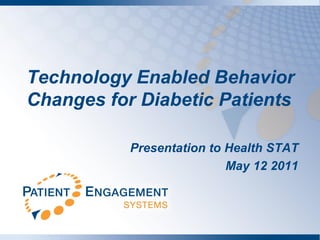Technology enabled behavior changes for diabetic patients
- 1. Technology Enabled Behavior Changes for Diabetic Patients Presentation to Health STAT May 12 2011
- 2. About Patient Engagement Systems Our Mission To improve care by offering technology that engages primary care providers and their patients to improve the management of chronic conditions in primary care settings. 2
- 3. Behavioral Economics in Healthcare What’s it mean? • How attributes are presented relatively (80% vs Framing 20% fat) Free • Higher worth placed on “free” stuff • Making decisions and changes are always Default harder that doing nothing Loss Aversion • Rather “not win” than lose Social Influences • Peer pressure is stronger than we believe Sources: Dan Ariely, Predictably Irrational
- 4. Behavioral Economics in Healthcare So What? Death • 2.4m/year Non adherence • $290b/year to Meds No show for MD appt • $150b/year Obesity • $148b/year Sources: Personal Decisions Are the Leading Cause of Death, Duke University Study New England Healthcare Institute National Health Statistic Report National Center for Health Statistics
- 5. Market Opportunity Emerging Market Segment Patient engagement is a core aspect of every major initiative in health care today Patient Center Accountable Care Reimbursement & Medical Homes Organizations Incentives
- 6. PATIENT ENGAGEMENT PLATFORM A Structured Flow Labs ordered by Provider 1. Provider orders labs 2. Test results gathered in central data repository 3. Proprietary algorithms analyze data for chronic Timely, secure transmission condition-specific factors • Diabetes (a1C, lipid profile, urine microalbumin) • Chronic Kidney Disease (createnine, eGFR, BUN, hemoglobin, electrolytes) 4. Results modeled 5. PCP receives analytics • flow sheets • treatment reminders Analytics for Patient Alerts & PES • population reports & disease Reminders PLATFORM Practice / EMR registry 6. Patient receives • alerts Activated Prepared • care reminders Patient Provider 7. Reports sent to case managers Ideal Clinical Encounter
- 7. Our Platform Solutions for Customer Problems Overdue for • Automated reminders for patient and provider recommended • Connects patient and practice test • Increases recommended testing up to 74% • Automated patient alerts Lab results • Provider flow sheets require action • Supports best practices Population • Population “report cards” and roster health • Reduce “lost to follow ups” management • Manage to incentive and P4P objectives
- 8. PATIENT ENGAGEMENT PLATFORM Demonstrated Reductions in Utilization and Charges 0% 0% -5% -5% -10% -10% -11% -11% -10% -15% -13% -15% -13% -15% -15% -20% -20% Total IP -22% Admissions Charges -25% -25% ER Visits -27% Total ER -30% -28% -30% Charges -35% -35% -40% -40% -39% -45% -42% -45% All < 65 65> All < 65 65> From Khan S, et al. The Effect of the Vermont Diabetes Information System on Inpatient and Emergency Department Use: Results from a Randomized Trial. Health Outcomes Research in Medicine 2010 1:61-66.
- 9. PATIENT ENGAGEMENT PLATFORM Lower Overall Costs Effect of PES Platform on Claims Paid Lowess Smoothing 500 Claims Paid per Member Validated 400 in NIH per Month ($) Clinical Trials 300 200 Control PES Group 100 -48 -36 -24 -12 0 12 24 36 48 Months Vertical line represents the start date for PES group patients and a randomly chosen date for control patients
- 10. Summary Points Patient Engagement is at the root of major changes in healthcare today Medical groups will need to adopt Patient Engagement as a core business strategy Actively engaging patients and providers in the care process results in improved finances, operations, and outcomes 10
- 11. Thank You For more information: Jim Rose Senior Vice President, Business Development Email: jim.rose@ptengage.com Telephone: (703) 537-5050











